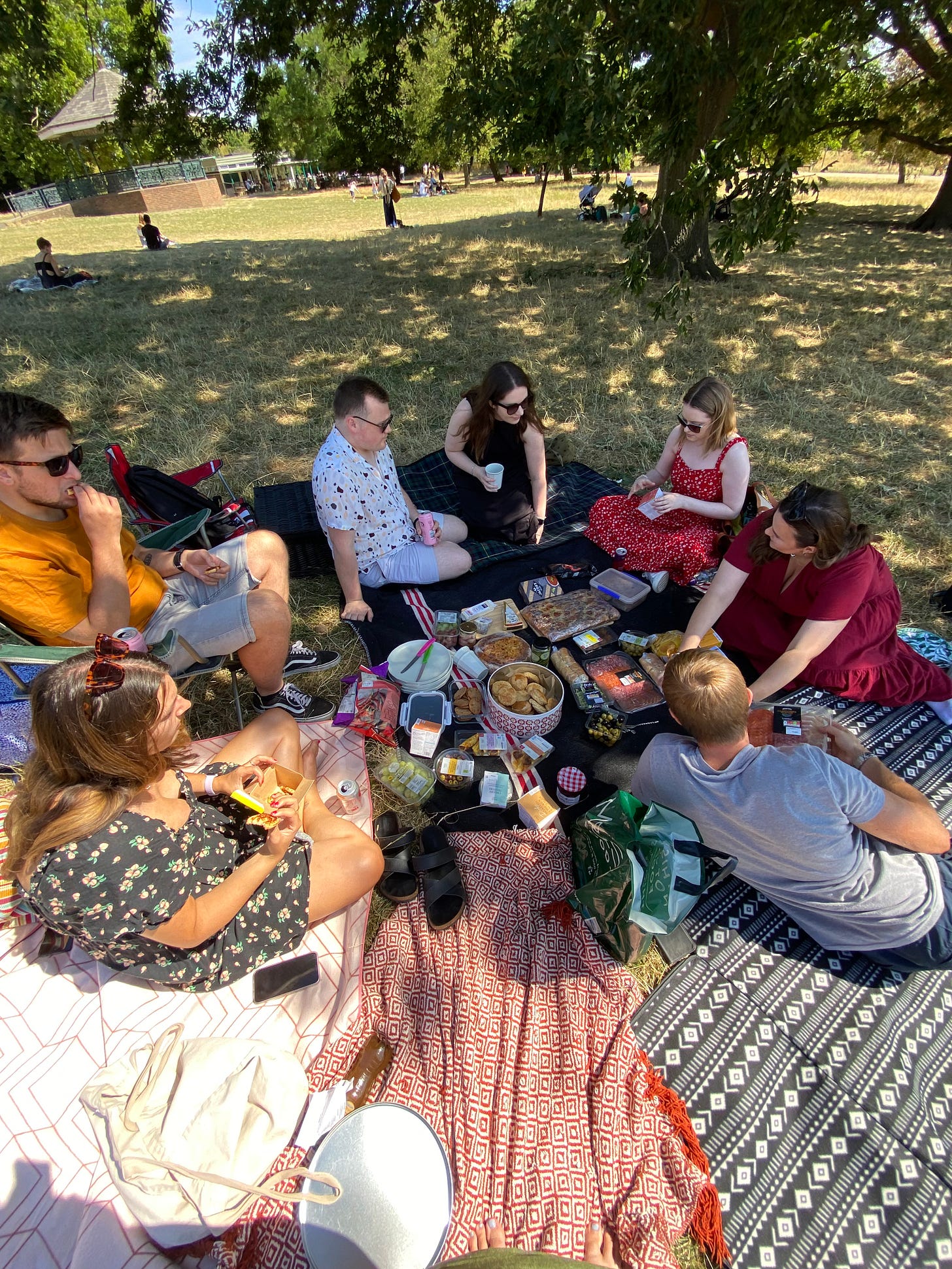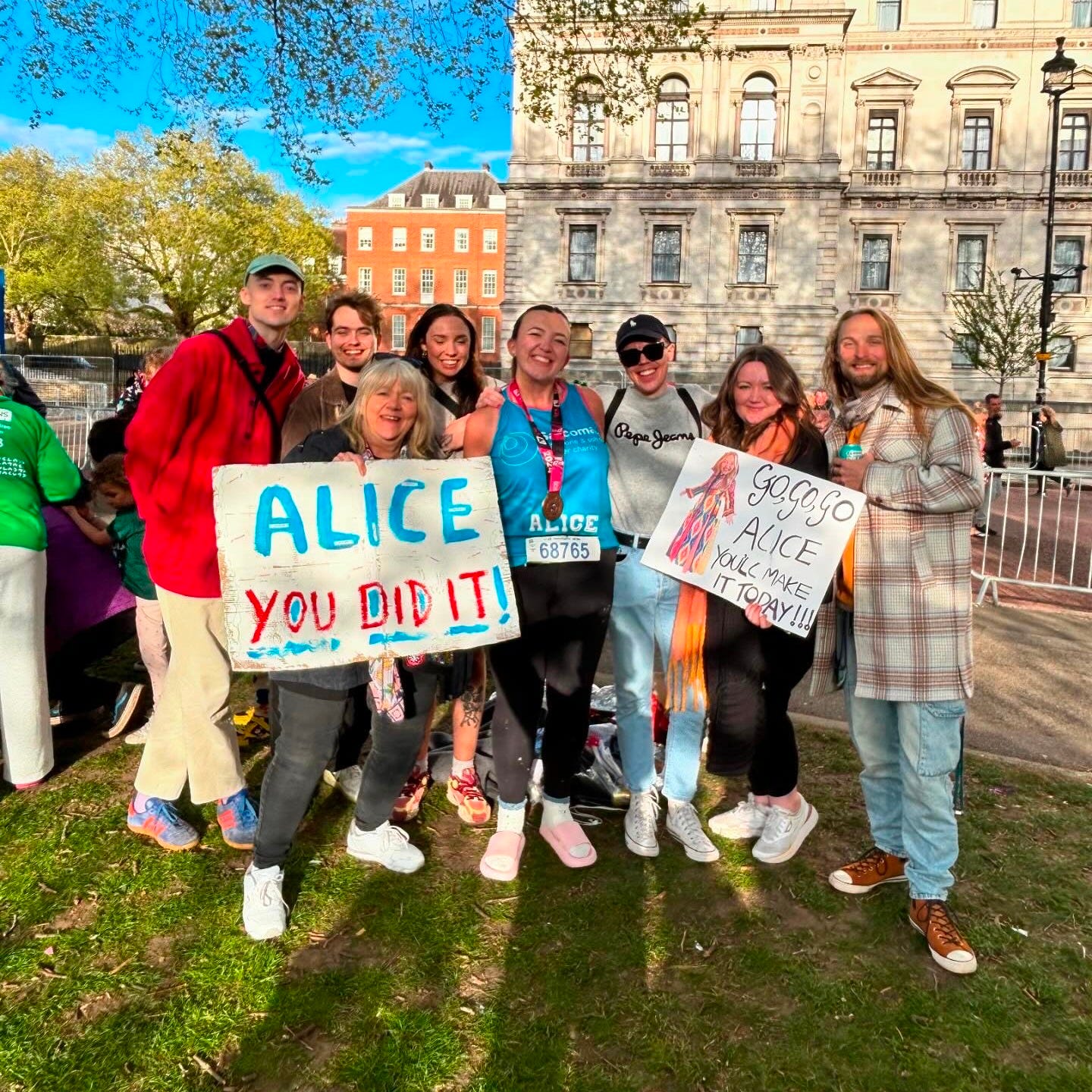To have a village, you need to be a villager
A short essay, my weekly recs & the first Sunday reset
👋 This week, I’ve been thinking a lot about friendship and what it means to show up for your loved ones, so we’re starting this week’s newsletter with a short essay on that very topic.
If you scroll further, you’ll find my weekly recommendations & the first-ever Sunday Reset, on how I want to improve my bedtime routine.
Thank you for being here!
Over the past couple of years, I have been known for saying yes to far too many things.
My rule is simple: if you invite me to something and I can go, I will.
I try to attend as much as possible and often find my weeks and weekends so full that my partner sighs in despair as I panic over how much I’m trying to cram in.
One day in April, for example, I found myself on a 45-minute tube from one side of London to the other, on the back of a morning swim with a friend from school, and on my way to my sister’s flat for lunch, only to then be heading out to Cambridge for a birthday party in the evening.
But the truth is, I love showing up. And that’s largely because a couple of years ago I swung completely the other way, and instead prioritised myself to the point of self-isolation.
We’ve all seen them, TikToks about protecting your peace, guarding your energy, prioritising your wellbeing. Articles on the importance of saying ‘no’. Group chats that validate your last-minute cancellations with friends — “You deserve to relax!”
I’ve watched, read, and listened to them all, and at 26, I was HOOKED. I felt seen. This is how I wanted to live my life.
No more awkward small talk, no more forced fun activities. Just meeting friends when I felt up for it, only attending parties where I knew half of the room, only doing what I thought was ‘worth it’, and keeping up with friends through social media instead.
At the time, I really did feel I was still participating in my friends lives. I knew what they were up to, where they’d been on holiday, who they were dating. I kept myself present by liking photos, posting comments, and of course, sending a ‘happy birthday babe!’ via Insta Stories. Because who needs to go to parties when everyone in the room is at your fingertips via Instagram instead?
Well, it turns out, we should all be going to the parties.
The turning point came for me when one night, on the back of declining an invite to a friend’s birthday party (I told myself it had been a busy week, nobody would miss me, it wouldn’t matter), I found myself scrolling through the Instagram stories of those in attendance, and I felt incredibly lonely.
I liked every photo posted, I scrolled through the messages in the group chat about the party, but I wasn’t in the group pics, I wasn’t up to date on my friends’ lives, and a month later, when we all met for dinner, I couldn’t join in on the anecdotes or in-jokes.
No matter how ‘protected’ I’d kept my energy, this wasn’t the life I’d imagined for myself.
When I pictured adulthood, friendships were always at the center. I envisioned getting ready with friends and grabbing cocktails after work, I pictured myself dating and meeting new people, and widening my social circle.
But the world got hard and social media got louder, and what started as a self-care, boundary-setting movement turned into a polished language of avoidance.
We stopped distinguishing between what drains us and what challenges us. And I just think that somewhere along the way, we lost what it means to be a good villager.
Don’t get me wrong, putting yourself first matters. Being afraid to say no is a fast track to burnout, and for many, the growing conversation around self-prioritisation has been key to unlearning toxic, people-pleasing habits that are both draining and damaging.
However, we rarely talk about the strength in having people outside of ourselves who we can rely on for help, and who can rely on us in return.
5 years ago, I took pride in being the strong, independent, solo-traveling woman. But now, if somebody tells me, “I do everything alone,” it just makes me feel sad. Because being a villager is two-way, it’s not just offering yourself up to help, it’s accepting help in return.
And yes, sometimes being a good villager means doing something uncomfortable, or going somewhere you’d rather not.
You might go out of your way to help a friend move house. Or show up to a dinner after work, exhausted but ready to celebrate your cousin’s new job. You stay on the wedding dance floor when your feet ache. Or take a train to Cambridge for a birthday, even though you’ve been up since six and could easily cancel.
It’s rarely convenient, but that’s the whole point.
Without active participation, your village cannot exist. That doesn’t mean your presence has to be perfect, but in a world full of pseudo-interactions over social media, real friendship takes work.
Just think, if everyone pulls back to protect their peace, the village becomes a ghost town. There’s no meals shared, no hands held, no memories to be made and passed down.
This pullback isn’t just personal, either. It mirrors what we’re seeing across society at the moment: collapsing volunteer networks, growing isolation, civic disengagement, rising loneliness in young people.
We scroll through each other’s lives every single day, but forget we still need lifts to the airport and someone to feed the cat when we’re away. We’ve made prioritising ourselves the norm, but that’s not how real connection works.
Real connection means risking awkwardness, inconvenience, and yes(!) discomfort. That is where love lives. And the village only works if you choose to be part of it.
Sunday Recs
What I’ve loved this week
#1 Everyone Wants a Piece of Pedro Pascal, Vanity Fair
This is one of my favourite celebrity profiles, maybe ever. And not just because I am undoubtedly obsessed with Pedro Pascal, I promise.
The profile is incredibly vulnerable from all sides, with the journalist opening up about how her own story links to Pascal’s. It also really captures how much of an adjustment it must be to become a household name in your 50s.
#2 Titan: The OceanGate Disaster, Netflix
I’m hesitant to admit that the only thing bigger than seeing Elton John during Glastonbury 2023 was following the OceanGate disaster between every set. My friends and I were all glued to it, and more than one meme was shared between us.
But the reason I’m recommending this documentary is because it really humanises something that was grossly sensationalised by the media. It also exposes the role of unchecked ego and uncovers just how avoidable this disaster was.
#3 Vicky Andrews on Inherited, a Shameless Media podcast
I’ve been a huge Shameless fan for a couple of years, but only recently got into their lesser-known podcasts, including Inherited.
This episode came out earlier in the year, but I waited until I was in the right headspace to listen. Vicky Andrews is the mother of Michelle Andrews, co-founder of Shameless Media, and at the start of this year, she was diagnosed with terminal brain cancer.
In this episode, Michelle interviews her mum about the life she’s lived, how her faith has carried her through the diagnosis, and how she’s making the most of the time she has left
It’s heartbreaking and incredibly moving, and it feels incredibly generous of both Vicky and Michelle to share something so intimate.
Sunday Reset #1: No more midnight doom-scrolling
Each Sunday, I’ll share the one change, experiment, or fresh perspective I’m taking into the week ahead.
I love it when I wake up early and am well-rested, ready for the day. My sweet spot is a 7am rise, but only if I’ve had a good night’s sleep.
However, the reality is that most days, I go to bed around midnight and wake up at 8:45, then roll straight into work (aka: making a coffee and sitting down at my laptop at the kitchen table).
I’m desperate to change this habit, as I feel like I have no time for myself on weekdays. I wake up, work, have dinner, and go to sleep after some obligatory reading/doom scrolling. This week, I want to take the first steps to change that.
On Tuesday, I listened to Mel Robbins’ podcast on evening habits that help you wake up energised. And the number one tip she shared was that to get your full eight hours, you simply need to get into bed an hour before you want to fall asleep.
It’s obviously easier said than done. Many of us get ourselves into a cycle where we get into bed but procrastinate from going to sleep, because we feel like we haven’t had enough of the day to ourselves. So then, we go to sleep later than planned and wake up later than planned, and carry on that cycle. The result is feeling unfulfilled during the day, and not making the most of the time outside of work.
It took hearing it spelled out like this to make me realise how much of a problem this has become in my life, and I felt well and truly called out.
So for me, this new routine will mean going to bed at 10pm, being asleep by 11pm, and waking up at 7am.
I created this newsletter to give myself a little more accountability. SO, here is week one, and I’ll let you know how it goes. ✨










This is so interesting Alice. It really made me think about my own situation right now, where I moved out of London and lost my job at the same time and although I've made some incredible friends here, I don't think I acknowledge how lonely it is. I was in the office 3 days a week and doing social things all the time and now I spend a lotttt of time with myself!
But it's a funny one. Because I definitely needed that. I get overwhelmed by social things and I often used them to distract myself from having to think about me too much, or anything bad going on in my life.
I guess it's just a balance, right? I've slowed down and I needed that. But there's slowing down and then there's isolating yourself.
Hmm. Food for thought hahaha!
Loved loved loved this! I'll definitely be carrying this into my week next week 💘